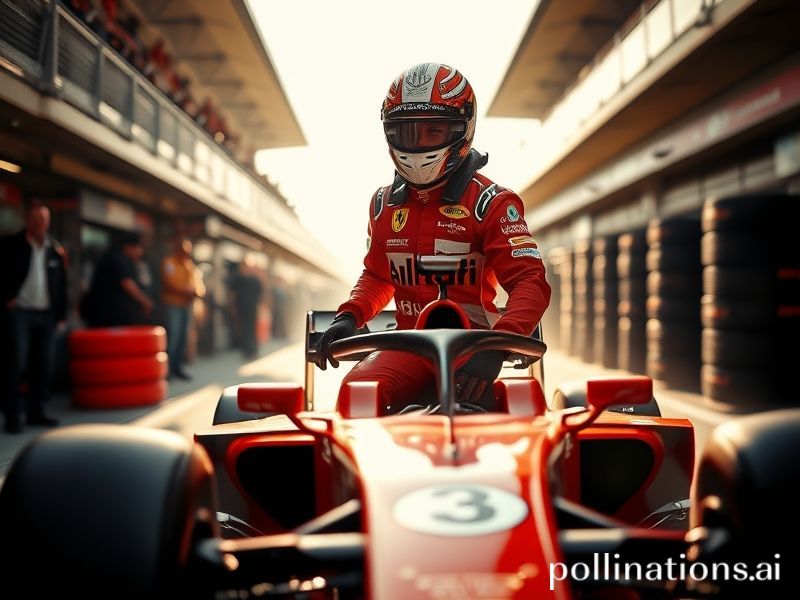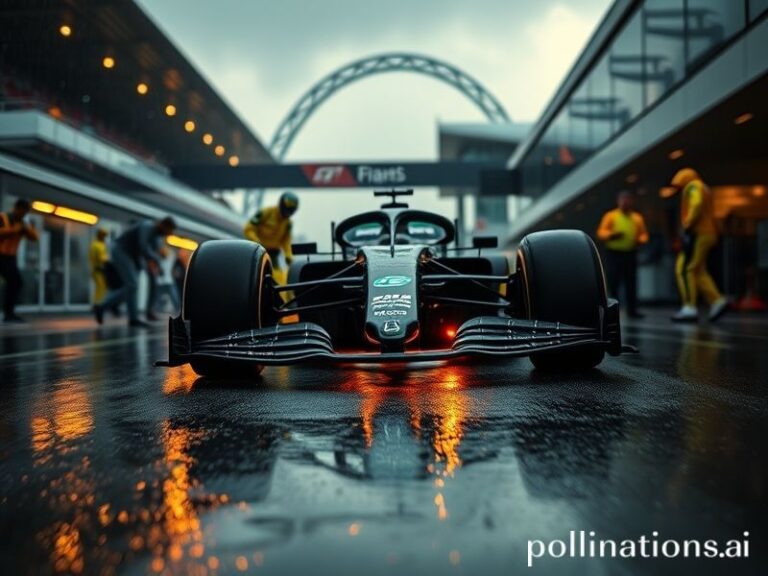How a Sheep-Shearing Kiwi Turned Formula 1 Into a Global Soft-Power Arms Race
Liam Lawson: The Kiwi Kid Who Turned Formula 1’s Grid into a Global Chessboard
By Our Man in the Paddock, Still Smelling of Eau de Petrol and Regret
Every so often, the planet’s most expensive parade of carbon fibre and fragile egos coughs up a human-interest subplot that isn’t about a tax exile buying another yacht. Enter Liam Lawson, 22, from Hastings, New Zealand, population roughly that of a medium-sized IKEA on a Saturday. Until recently his most viewed footage online involved drifting a rental Toyota Corolla around roundabouts for a local news segment. Now he is the accidental protagonist in a geopolitical soap opera starring Red Bull’s Austrian money, Honda’s Japanese pride, Ford’s incoming American overlords, and roughly 2.4 billion viewers who treat tire strategy the way medieval peasants debated transubstantiation.
Lawson’s elevation from reserve driver to points-scoring stand-in at Zandvoort—after Daniel Ricciardo discovered that metacarpals are not, in fact, made of Vegemite—did more than silence Dutch orange-clad hordes. It reminded the world that talent can still vault borders faster than a sanctions-dodging oligarch’s jet. Overnight, #Lawson became a trending term in São Paulo sushi bars, Seoul PC bangs, and the sort of London pubs where the wallpaper is older than the average Haas strategy meeting. Suddenly, a nation famous for exporting Sauvignon Blanc and Lord of the Rings extras was exporting the possibility that the next world champion might know how to shear a sheep between simulator sessions.
The ripple effects are deliciously absurd. New Zealand’s GDP didn’t budge, but Air NZ’s share price did—because two hedge funds ran the numbers on “Kiwi soft-power index” and decided any country that can produce a driver who overtakes at Eau Rouge without soiling himself is probably good for tourism. Meanwhile, the Japanese press breathlessly tracked Lawson’s use of Honda power units like they were monitoring a newborn imperial heir. Toyota executives, still sulking over their own aborted F1 romance, were reported to have held a three-hour emergency board meeting titled “How Did We Let A Sheep Farm Beat Us?”
In Europe, the Italian media treated Lawson’s debut as confirmation that the universe is fundamentally unjust: a kid who grew up racing on tracks with more sheep than grandstands was now embarrassing Ferrari academy graduates who learned telemetry before potty training. Toto Wolff, Mercedes’ perpetually beleaguered team principal, was asked whether he’d sign Lawson. He replied, “We are monitoring all options,” which in F1-ese translates to “We’ll wait until Red Bull ruins him first.” Cynical? Perhaps. But in a sport where last year’s wunderkind is this year’s pundit, scepticism is just seat-belt practice.
The broader significance is that Lawson embodies the last meritocratic loophole in a world increasingly gated by algorithms and inherited wealth. While Silicon Valley builds AI to pick stocks and dates, a bloke who once used a PlayStation wheel duct-taped to a desk is now deciding whether to lift and coast at 320 km/h with a sheikh’s yacht in the harbour watching. It’s Horatio Alger on nitromethane, except the bootstraps are Pirelli slicks and the reward is… well, still mostly yacht owners profiting, but at least the kid gets a decent seat.
Global supply chains, take note: Lawson’s success depends on microchips from Taiwan, fuel from the Middle East, engines from Japan, sim data processed in Amazon’s Dublin server farm, and a dietitian in Milton Keynes who swears by Manuka honey. One race result, and suddenly New Zealand’s trade negotiators have anecdotal leverage in rooms where dairy tariffs are discussed. Soft power used to come from poetry and jazz; now it comes from a 22-year-old calmly explaining understeer to a reporter while secretly wondering if the media pen’s sushi is safe to eat.
Conclusion? In a year when the Doomsday Clock nudged closer to midnight and billionaires began selling tickets to the apocalypse, Liam Lawson’s ascent is a rare, carbon-neutral puff of optimism. Not because it solves climate change or inequality—rest assured, the private jets still idled on the tarmac—but because it proves that, occasionally, talent can still outrun privilege before the accountants close the loophole. Enjoy the fairy tale while it lasts; the sport will chew him up, monetize the highlight reel, and move on to the next teenage prodigy. But for now, the world is united in the refreshing delusion that a kid from the edge of the map can beat the house at its own rigged casino. And if that isn’t worth a cynical toast, nothing is.







